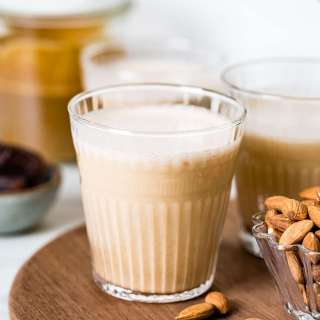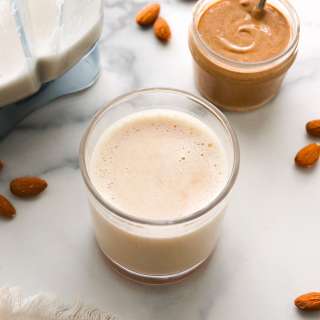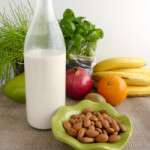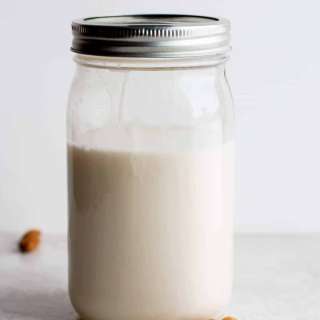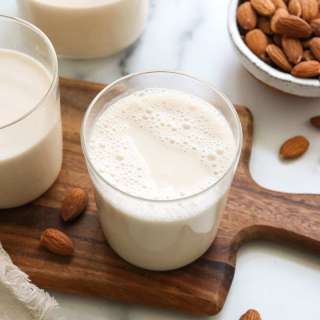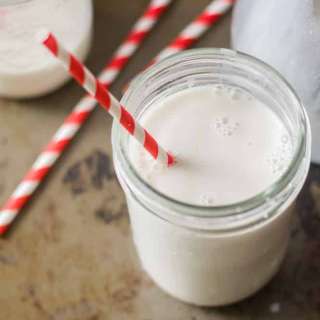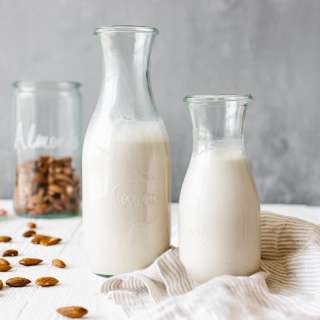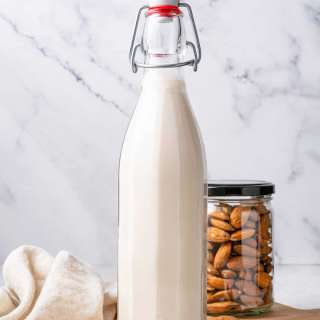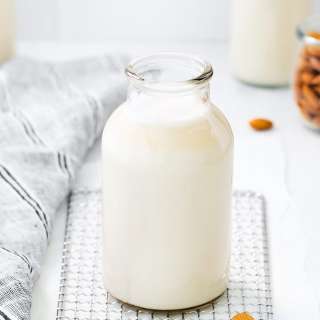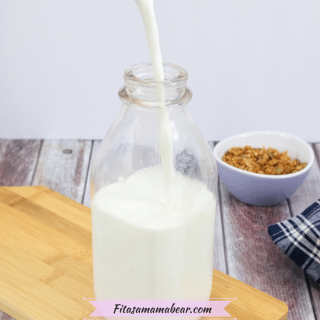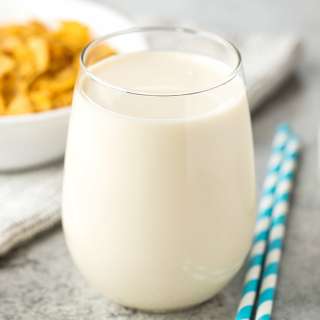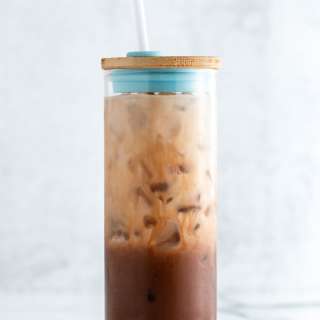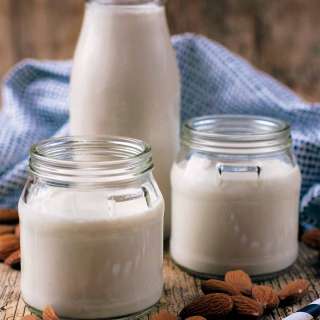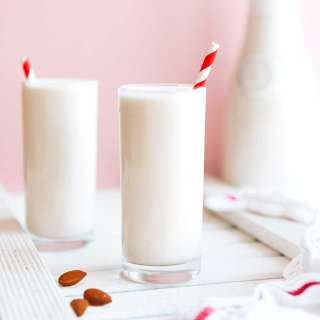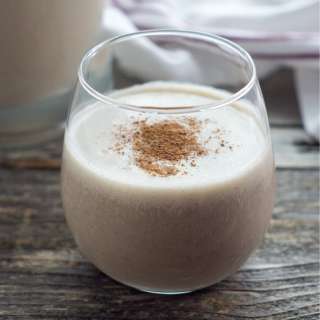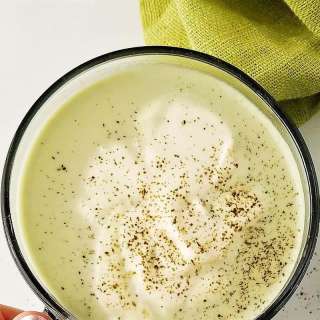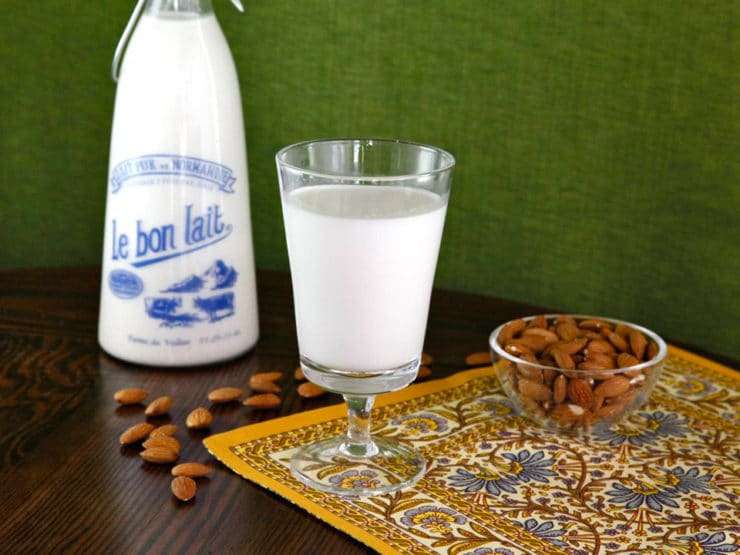
How to Make Almond Milk
User Reviews
4.6
75 reviews
Excellent

How to Make Almond Milk
Report
Learn to make creamy non-dairy almond milk at home. Use in place of dairy milk in coffee, over cereal or on its own!
Share:
Ingredients
- 1 cup raw unsalted almonds, skin-on
- 4 cups filtered water, plus more water for soaking almonds
- 1 1/2 teaspoons honey, agave nectar, maple syrup, or one whole pitted date (optional)
- 1 teaspoon vanilla extract (optional)
- Dash sea salt (optional)
Instructions
- Place raw almonds in a bowl and cover with cold water. Allow to soak overnight up to 48 hours, then drain and rinse. If soaking longer than overnight, change the cold soaking water every 12 hours.
- After soaking, drain and rinse the almonds. Do not peel the almonds; according to my recipe testing, keeping the skins on actually helps to reduce the grittiness of the almond milk (counter intuitive, I know!). Combine soaked almonds and 4 cups of filtered water in a blender.For a whole milk texture, I use 4 cups of water to 1 cup almonds. For a thinner texture, feel free to add more water-- you can adjust the texture to taste. The more water you add, the lower in fat the milk will be per serving; however, you don't want to add too much liquid or it will turn watery. Best to add water in small batches till the texture seems right to you.
- Blend on low, then slowly raise the speed to high for 1-2 minutes till the milk is completely smooth and no chunks of nuts remain. If desired, add sweetener, vanilla and/or salt to taste, then blend again to combine (if using a date, make sure you blend till it's completely pulverized). Feel free to adjust the sweetness to taste.
- Strain milk through a fine mesh strainer, tea towel, cheesecloth or nut milk bag into a storage container. A nut bag will work best for keeping your milk smooth and chunk-free. I usually strain the milk into a quart mason jar, which works perfectly with the 4 cup to 1 cup ratio of water to almonds.
- If using a mesh strainer, you will need to agitate the solids a bit to help all the milk drip through. I don't scrape them (this can push the solids through the strainer), but I do gently stir and move the solids around to make room for the liquid to come through. Similarly, if using a nut bag, you will need to gently squeeze the bag till all of the milk seeps through.
- Transfer milk to the refrigerator and chill thoroughly. It should keep for 3-4 days if refrigerated. I usually shake mine a bit before pouring to make sure it's well blended.
- Once you're finished straining the milk, you will have a small amount of leftover almond pulp. This can be discarded or dehydrated into almond flour and used as a gluten free breading for fish or chicken or mixed into baked goods. To do this, first adjust your oven to the lowest heat setting. Place the leftover almond pulp in a mesh strainer for about 30 minutes to allow any remaining liquid to drain off.
- With a rubber spatula, spread the pulp as thinly as possible onto a baking pan lined with parchment or a silicone baking sheet. Place in the oven at 200 degrees.
- Allow the paste to dehydrate for a few hours up to overnight. Check every couple of hours; when the meal hardens into a dry sheet, it's finished.
- Break up the dehydrated paste and pulverize using a food processor for 1-2 minutes. You can also use a fork, but a food processor will give you a much finer grind.
- You will be left with about ½ cup of almond flour.
- Use almond milk anywhere you would use regular milk-- in coffee or tea, on cereal, or as a milk substitute in recipes.
Notes
- You will also need: Blender or food processor, fine mesh strainer or nut bag or clean tea towel or cheesecloth, 1 quart glass jar or storage container
Nutrition Information
Show Details
Calories
192kcal
(10%)
Carbohydrates
7g
(2%)
Protein
6g
(12%)
Fat
16g
(25%)
Saturated Fat
1g
(5%)
Sodium
18mg
(1%)
Potassium
205mg
(6%)
Fiber
3g
(12%)
Sugar
3g
(6%)
Calcium
81mg
(8%)
Iron
1mg
(6%)
Nutrition Facts
Serving: 4servings
Amount Per Serving
Calories 192 kcal
% Daily Value*
| Calories | 192kcal | 10% |
| Carbohydrates | 7g | 2% |
| Protein | 6g | 12% |
| Fat | 16g | 25% |
| Saturated Fat | 1g | 5% |
| Sodium | 18mg | 1% |
| Potassium | 205mg | 4% |
| Fiber | 3g | 12% |
| Sugar | 3g | 6% |
| Calcium | 81mg | 8% |
| Iron | 1mg | 6% |
* Percent Daily Values are based on a 2,000 calorie diet.
Genuine Reviews
User Reviews
Overall Rating
4.6
75 reviews
Excellent
Other Recipes
